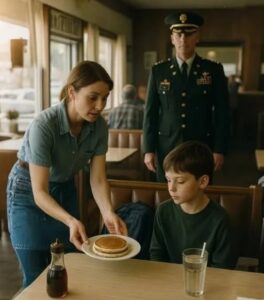She Fed Him Pancakes Every Morning Without Asking Questions — Then One Day, Military SUVs Surrounded the Diner

Before the sun broke over the flat Kansas horizon, Jenny Millers, just twenty-nine, would tie her worn apron around her waist, unlock the front door of Rosie’s Diner, and breathe in the familiar scent of coffee and syrup.
The diner sat between a dusty laundromat and a sleepy hardware store, the kind of place where you knew everyone by name — and they knew your business. For Jenny, it wasn’t just a job. Having lost her parents in her teens and watched her only aunt move away, Rosie’s was the closest thing to family she had left. Life there was predictable, sometimes lonely, until the morning he walked in.
The Boy in the Corner Booth
He couldn’t have been more than ten. Thin, guarded, eyes constantly scanning the room like he was looking for someone — or making sure no one was looking for him. Every morning at 7:15, he slipped into the same corner booth, slid a battered backpack onto the seat, and asked for nothing more than a glass of water.
He’d sit through the breakfast rush quietly, head buried in a book, not touching the drink. Not a word to anyone.
By the fifteenth morning, Jenny couldn’t take it anymore. She set down a plate of steaming pancakes in front of him.
“Kitchen made too many,” she said casually, walking away before he could protest.
Ten minutes later, the plate was clean. As she wiped down the counter, she heard a barely audible “Thank you.”
The next day, it was toast. Then oatmeal on cold mornings, scrambled eggs when the wind howled outside. He always ate. He never offered his name, and she never asked.
The Warnings
Her coworker Kathy rolled her eyes.
“Runaway kid. He’ll vanish one day. Don’t get attached.”
Her manager, Mark, complained about “giving food away for free.” Jenny just shrugged and covered the cost with her own tips. She knew what it meant to be hungry — and to have someone notice.
And Then — Nothing
One morning, the booth was empty. Then the next. A week passed. Ten days.
People online who’d followed her little kindness on social media started mocking her — calling it a “fake feel-good story.” But every morning, she made pancakes anyway, setting them on the counter.
At night in her small apartment, she’d open her father’s old Army journal and read his favorite line:
“Sharing half a loaf doesn’t make you poor. But forgetting to share can leave you truly hungry.”
The Day the SUVs Came
On the twenty-third day, the diner’s bell jingled — not from a customer, but from the heavy boots of uniformed soldiers. Four black SUVs lined the parking lot. At their head was Colonel David Reeves, cap tucked under his arm, a sealed envelope in his hand.
“Are you Jenny Millers?”
He told her the boy’s name: Adam Thompson. His father, Master Sergeant James Thompson, had died in Afghanistan. His mother had disappeared long before. Adam had nowhere to go — until he found Rosie’s.
In the event of his death, James had left instructions: someone must find Jenny at Rosie’s Diner and tell her thank you.
Jenny’s knees nearly buckled. She realized the food hadn’t just filled Adam’s stomach — it had protected his dignity.
The Colonel saluted her. One by one, every soldier in the diner did the same.
A Booth Becomes a Memorial
News spread fast. Strangers started leaving hundred-dollar tips. Veterans made a point to sit in Adam’s booth.
Mark, the same manager who once complained, hung a folded American flag over the seat and mounted a plaque:
“Reserved for those who serve — and those who care.”
A week later, Jenny received a letter from Adam. It ended with,
“Thank you for seeing me when no one else did. Your friend, Adam.”
She framed it and hung it behind the counter.

The Legacy of a Simple Act
Over the months, Rosie’s Diner became a quiet stop for service members passing through. Challenge coins and unit patches piled up on the counter. That summer, Jenny and Mark hosted a fundraiser for children of deployed soldiers, matching every donation.
Almost a year later, she found a challenge coin beneath the glass of Adam’s booth. It read: “Semper Memer — Always Remembering.”
The booth was empty that day — just like it had been the first morning Adam walked in. Only now, Jenny knew someone out there felt truly seen.
And she understood: that was the kind of legacy worth leaving.